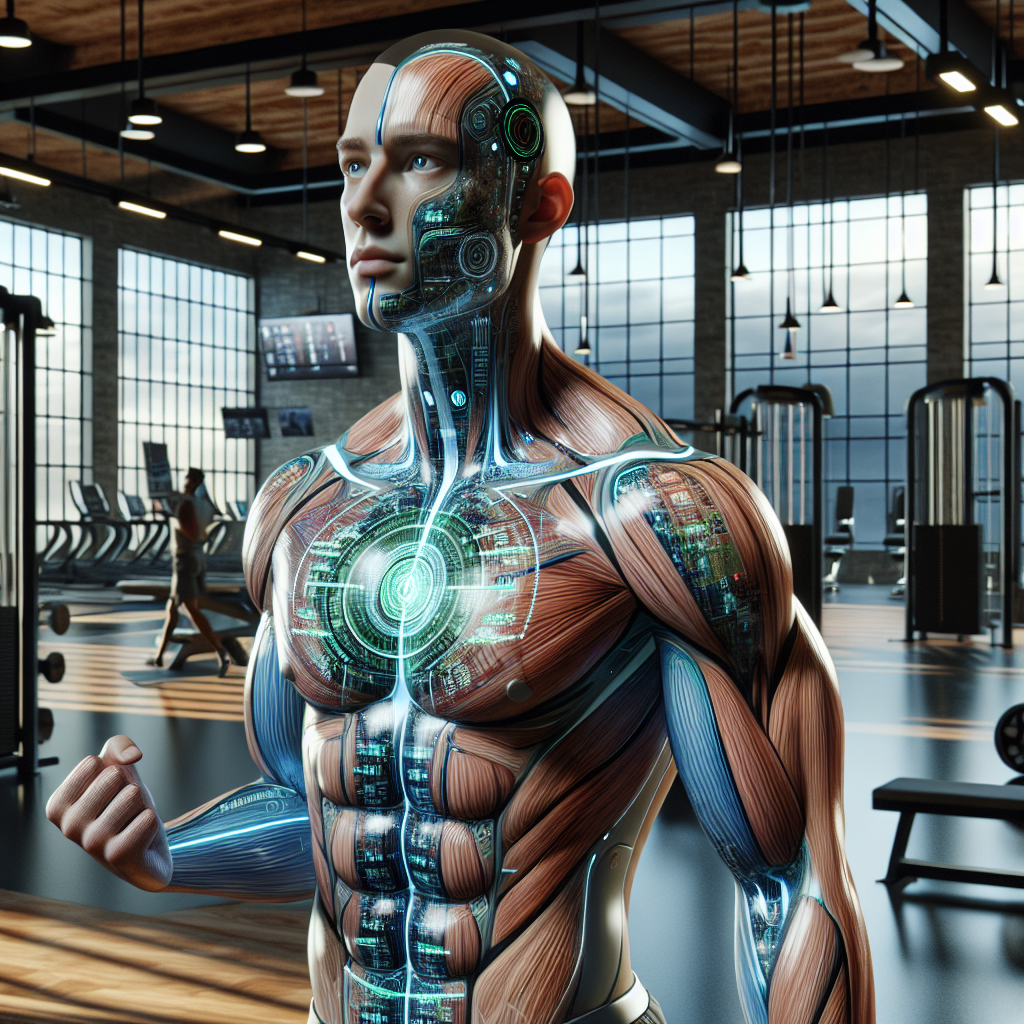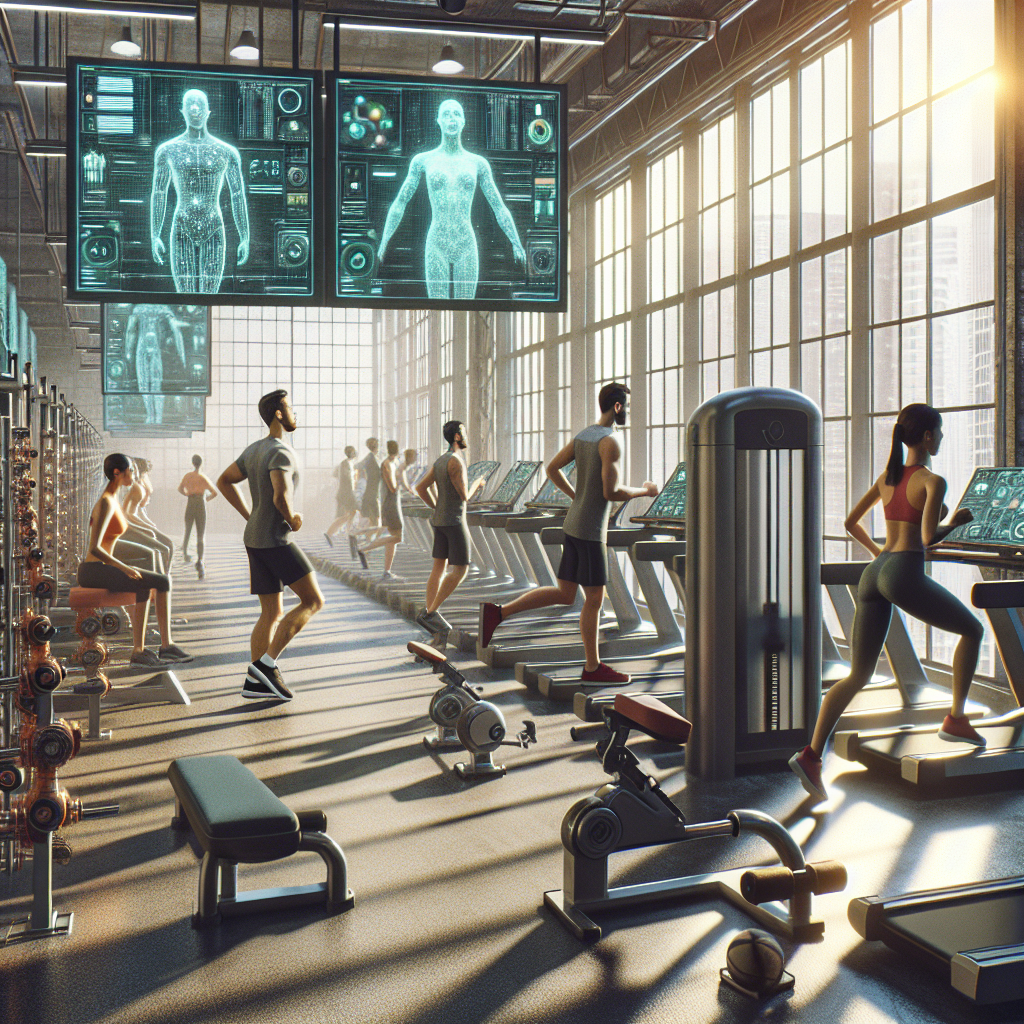By 2025, AI-powered personalized fitness regimens will have redefined the way individuals approach their workouts, offering precision, convenience, and a level of customization that was previously unimaginable. These advanced systems will not only track and analyze every aspect of physical activity but will also provide real-time feedback and tailored guidance to ensure optimal performance and results. As AI continues to evolve, its integration into the fitness landscape promises to revolutionize our understanding of health and wellness through innovative technologies and data-driven insights.
The Rise of AI in the Fitness Industry
The integration of artificial intelligence (AI) within the fitness industry marks a significant shift from traditional workout methods to more intelligent, adaptive systems. With advancements in machine learning, data analytics, and wearable technology, the fitness sector is experiencing a transformation that prioritizes user-specific needs over one-size-fits-all programs.
Evolution of Fitness Technology
Historically, fitness routines were largely based on generalized guidelines and personal trainers’ recommendations. However, with the advent of technology, automated devices like pedometers and heart rate monitors laid the groundwork for more sophisticated AI-driven solutions. Today, AI algorithms analyze vast amounts of data to create personalized fitness plans that adapt in real time to an individual’s performance, preferences, and goals.
AI’s Role in Personalized Training
Artificial intelligence plays a crucial role in developing personalized training regimens. By leveraging data from various sources such as wearables, fitness apps, and health records, AI systems can tailor workouts that cater to individual needs. This customization includes adjusting exercise intensity, duration, and type based on real-time feedback and historical performance metrics.
Key Features of AI-Powered Fitness Regimens
AI-powered fitness regimens offer a host of features designed to enhance user experience and outcomes. These features are driven by cutting-edge technology and are tailored to provide comprehensive support across different aspects of fitness.
Data-Driven Insights
- AI systems collect and analyze data to provide insights into workout efficacy, making it easier to track progress and identify areas for improvement.
- Machine learning algorithms use historical data to predict future performance trends, enabling users to set realistic goals and achieve them efficiently.
Real-Time Feedback
- Users receive immediate feedback on their workout form, posture, and technique through AI-powered systems, reducing the risk of injury and enhancing performance.
- AI applications can adjust exercise parameters in real-time, ensuring that users consistently operate within their optimal performance zone.
Customizable Workout Plans
- AI-generated workout plans are tailored to an individual’s fitness level, goals, and preferences, offering a unique experience for each user.
- These plans can be modified dynamically based on user feedback and performance metrics, ensuring continuous engagement and motivation.
Virtual Personal Trainers
- AI-powered virtual trainers provide personalized coaching, guidance, and motivation, simulating the experience of having a human trainer.
- These trainers utilize natural language processing (NLP) to understand user queries and provide relevant, actionable advice.
The Technology Behind AI Fitness Solutions
The development of AI-powered fitness solutions relies on a combination of advanced technologies. These technologies work together to create a seamless, integrated experience that adapts to the user’s evolving needs.
Machine Learning Algorithms
Machine learning algorithms are at the core of AI fitness solutions. These algorithms analyze user data to identify patterns and make predictions about future performance. By learning from past behaviors and outcomes, AI systems can create highly personalized training regimens that adapt over time.
Wearable Technology
Wearable devices, such as smartwatches and fitness trackers, provide crucial data that feed into AI systems. These devices monitor various metrics, including heart rate, steps taken, calories burned, and sleep patterns, offering a comprehensive view of an individual’s health and fitness.
Natural Language Processing (NLP)
NLP enables AI systems to interact with users in a human-like manner. Through voice commands or text inputs, users can communicate with their AI trainers, receive feedback, and ask questions. This interaction enhances user engagement and satisfaction by providing a more intuitive experience.
Data Analytics
Data analytics tools process the vast amounts of information collected from various sources. These tools identify trends, detect anomalies, and provide actionable insights to users and trainers. By understanding the data, AI systems can make informed decisions to optimize workout plans.
Benefits of AI-Powered Fitness Regimens
AI-powered fitness regimens offer numerous benefits that enhance both the user experience and fitness outcomes. These benefits arise from the ability of AI systems to provide highly tailored support and guidance.
Improved Efficiency and Effectiveness
- AI-driven workouts are tailored to maximize efficiency, ensuring that users achieve their fitness goals in the shortest possible time.
- By continuously adapting to user performance, AI systems prevent plateaus and maintain workout effectiveness.
Enhanced User Engagement
- Personalized recommendations and real-time feedback keep users motivated and engaged, reducing dropout rates.
- Gamification features, such as rewards and challenges, encourage users to remain consistent in their fitness journey.
Accessibility and Inclusivity
- AI-powered fitness solutions cater to users of all ages and fitness levels, offering modified exercises and guidance for those with physical limitations.
- The availability of virtual trainers makes personalized coaching accessible to a broader audience, regardless of geographic location.
Cost-Effectiveness
- AI fitness solutions reduce the need for expensive gym memberships or personal trainers, making fitness more affordable for many individuals.
- Users can invest in a one-time purchase of a wearable device or subscription to an AI-powered app, saving money in the long term.
Challenges and Considerations
Despite the numerous advantages of AI-powered fitness regimens, several challenges and considerations must be addressed to ensure widespread adoption and effectiveness.
Data Privacy and Security
With the increasing amount of personal data collected by fitness devices and AI systems, concerns about data privacy and security are paramount. Ensuring that user information is protected and used responsibly is crucial for maintaining trust.
Accuracy and Reliability
AI systems must consistently provide accurate and reliable feedback to be effective. Any inaccuracies in data collection or analysis can lead to suboptimal training recommendations and potentially hinder progress.
Technological Barriers
Access to the latest AI technologies and devices can be limited by factors such as cost, availability, and technical expertise. Bridging this gap is essential to ensure that AI-powered fitness solutions are accessible to all.
Human Element
While AI systems offer unparalleled customization and precision, the human element of empathy and personalized interaction is difficult to replicate. Striking a balance between AI capabilities and human touch is necessary for a holistic fitness experience.
The Future of AI in Fitness
As AI technology continues to advance, its impact on the fitness industry is expected to grow. Emerging trends and innovations will further enhance the capabilities of AI-powered fitness systems, offering even greater benefits to users.
Integration with Other Technologies
Future AI fitness solutions will likely integrate with other technologies, such as augmented reality (AR) and virtual reality (VR), to create immersive workout experiences. These technologies can simulate different environments and provide interactive feedback, making workouts more engaging and enjoyable.
Advanced Personalization
AI systems will become more adept at understanding individual preferences, habits, and biometric data, enabling even more precise personalization. This level of customization will ensure that users receive the most effective training plans tailored to their unique needs.
Collaborative AI Systems
As AI systems become more sophisticated, they will have the ability to collaborate with each other, sharing data and insights to provide a more comprehensive fitness experience. This collaboration can lead to more holistic approaches to health and wellness, encompassing not just physical fitness but also mental and emotional well-being.
Ethical AI Practices
As AI becomes more integrated into the fitness landscape, ensuring ethical practices in data usage, privacy, and decision-making will be crucial. Transparent and responsible AI systems will help build user trust and foster long-term adoption.
Conclusion
The emergence of AI-powered personalized fitness regimens marks a new era in the fitness industry. By leveraging advanced technologies, AI systems offer tailored, efficient, and effective workout experiences that cater to individual needs and preferences. While challenges remain, the potential benefits of AI in fitness are vast, promising a future where personalization, accessibility, and innovation are at the forefront of health and wellness.
Transform Your Fitness Journey Today!
Discover the Future of Fitness with PurelyFit
Say goodbye to costly trainers and complex diets. Embrace AI-powered workouts and personalized nutrition plans that adapt to your lifestyle and goals. With over 600,000 recipes and real-time progress tracking, PurelyFit is your ultimate partner in achieving your fitness aspirations.










